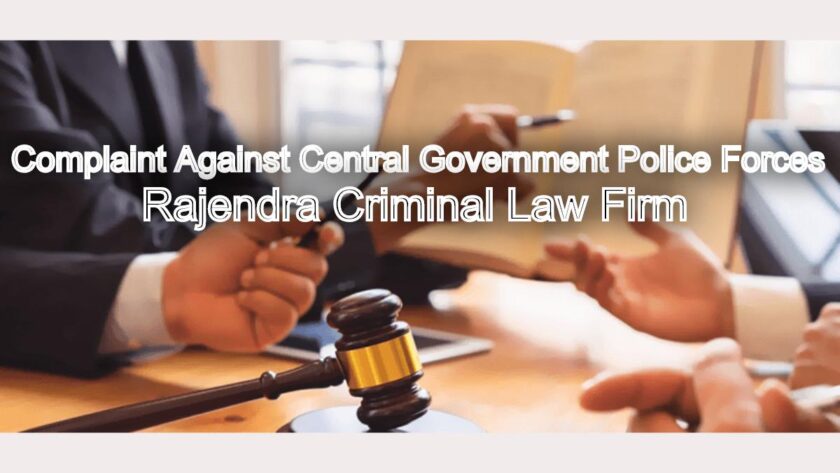Steps to File a Complaint: Central Government Police Forces, including the CISF, CRPF, and BSF, play a vital role in maintaining national security. However, instances of alleged misconduct or abuse of power can occur. Inevitably, individuals may find themselves in situations where they need to file a complaint. Consequently, understanding the correct procedures is crucial to ensure accountability and justice.
Navigating Grievances: Steps to File a Complaint Against Central Government Police Forces (CISF, CRPF, BSF)
Understanding the Jurisdiction and Nature of Complaints
Firstly, it is essential to grasp the jurisdictional nuances. Simply put, complaints against these forces can arise from various scenarios. For instance, allegations of excessive force, illegal detention, or corruption may necessitate legal action. Furthermore, the nature of the complaint dictates the appropriate channels for redressal.
Moreover, these forces operate under the authority of the Ministry of Home Affairs. Therefore, complaints often involve internal departmental mechanisms and external legal avenues. Additionally, understanding the specific mandate of each force—CISF for industrial security, CRPF for internal security, and BSF for border security—helps tailor the complaint.
Internal Departmental Mechanisms for Complaint Redressal
Specifically, internal departmental mechanisms provide the first line of redressal. For example, each force has its own grievance redressal cells. Likewise, these cells handle complaints related to service matters, disciplinary actions, and operational conduct.
Furthermore, complaints can be lodged with the respective force’s senior officers. In other words, individuals can escalate their concerns to higher authorities within the chain of command. Moreover, these internal processes aim to resolve issues efficiently and transparently.
External Legal Avenues for Filing Complaints
Nevertheless, when internal mechanisms fail to provide satisfactory resolution, external legal avenues become necessary. Indeed, individuals can approach various judicial and quasi-judicial bodies. Consequently, these avenues offer independent scrutiny and impartial adjudication.
Specifically, the National Human Rights Commission (NHRC) handles complaints related to human rights violations. For instance, allegations of torture or custodial violence fall under its purview. Likewise, the Central Administrative Tribunal (CAT) addresses service-related grievances of government employees, including those in these forces.
Furthermore, individuals can file criminal complaints with the local police or approach the courts directly. In other words, serious offenses like assault or corruption warrant criminal investigation and prosecution. Moreover, these external avenues ensure accountability and uphold the rule of law.
Steps to File a Complaint: A Detailed Guide
Therefore, following a structured approach is crucial when filing a complaint. To begin with, gather all relevant evidence. Specifically, this includes documents, photographs, and witness testimonies. Additionally, maintain a detailed record of events and communication.
Moreover, draft a clear and concise complaint. In essence, articulate the grievances and provide factual details. Furthermore, specify the desired outcome, such as disciplinary action or compensation.
Subsequently, submit the complaint to the appropriate authority. For example, if filing with the NHRC, follow their prescribed format and submission guidelines. Likewise, if approaching the courts, engage a legal professional to draft the petition.
Additionally, retain copies of all documents and correspondence. In turn, this ensures a comprehensive record of the complaint and subsequent proceedings. Moreover, follow up regularly to monitor the progress of the case.
Rajendra Criminal Law Firm: Expertise in Criminal Matters
In this context, Rajendra Criminal Law Firm offers expert legal services in criminal matters, including cases involving complaints against government forces. Indeed, their experienced advocates can provide guidance and representation throughout the legal process. Consequently, they possess a deep understanding of criminal law and administrative procedures.
Furthermore, Rajendra Criminal Law Firm employs a client-centric approach. In other words, they prioritize client interests and ensure effective legal representation. Specifically, they assist in drafting complaints, gathering evidence, and representing clients in court.
Moreover, their commitment to ethical standards and professional integrity ensures that cases are handled diligently and transparently. In turn, they advocate for justice and accountability.
Key Legal Concepts and Procedures
In addition, several key legal concepts and procedures play a crucial role in these cases. For instance, Article 21 of the Indian Constitution guarantees the right to life and personal liberty. Essentially, this provision safeguards individuals against arbitrary actions by state authorities.
Another critical concept is Section 197 of the Code of Criminal Procedure (CrPC). Specifically, this section provides protection to public servants from prosecution without prior sanction. Likewise, writ petitions under Article 226 or 32 of the Constitution enable individuals to seek judicial intervention in cases of fundamental rights violations.
Furthermore, administrative tribunals like the CAT offer specialized forums for resolving service-related disputes. For example, these tribunals ensure efficient and expeditious adjudication. Also, human rights commissions like the NHRC investigate and recommend actions in cases of human rights abuses.
The Importance of Documentation and Legal Counsel
Moreover, thorough documentation and legal counsel are essential for successful complaint resolution. Indeed, detailed records and legal expertise can significantly enhance the chances of a favorable outcome. Specifically, legal professionals can navigate complex procedures and advocate for client rights.
Similarly, witness testimonies and forensic evidence can strengthen legal claims. In other words, corroborating evidence can substantiate allegations and ensure accountability.In addition, seeking timely legal advice is crucial. For instance, delays in filing complaints can weaken legal positions. Moreover, legal counsel can provide guidance on appropriate legal strategies.
Frequently Asked Questions
You can file complaints regarding excessive force, illegal detention, corruption, human rights violations, and service-related grievances. Essentially, any alleged misconduct falls under potential complaint categories.
If internal mechanisms are ineffective, you can approach external bodies like the National Human Rights Commission (NHRC) for human rights violations, the Central Administrative Tribunal (CAT) for service matters, or file a criminal complaint with the local police or courts.
Gather all relevant evidence, including documents, photographs, witness testimonies, and detailed records of events and communication. Clear and concise documentation strengthens your case.
Section 197 of the Code of Criminal Procedure (CrPC) requires prior sanction for prosecuting public servants, including personnel from these forces, for actions taken in their official capacity. This adds a layer of complexity to legal proceedings.
Legal counsel ensures you navigate complex procedures, understand your rights, and present a strong case. They can help draft complaints, gather evidence, and represent you in court, increasing your chances of a favorable outcome.
Conclusion
In summary, filing a complaint against Central Government Police Forces requires a thorough understanding of legal procedures and mechanisms. Therefore, following a structured approach and seeking expert legal counsel are essential. Consequently, Rajendra Criminal Law Firm offers valuable assistance in navigating these complex situations. Ultimately, by upholding accountability and ensuring transparency, the legal system can protect individual rights and maintain public trust. Thus, a robust legal framework is necessary to address grievances and ensure justice.
Read More
- How to Report Corruption in Central Public Works Department (CPWD)
- Protecting Innocence: Legal Advocacy for Child Abuse Cases
- Reporting Misconduct: Complaint Process for Central Government Officials
- How to Register a Grievance Against Income Tax Department Officers
- How to File a Complaint Against Central Government Officers: A Step-by-Step Guide
- National Human Rights Commission (NHRC):





